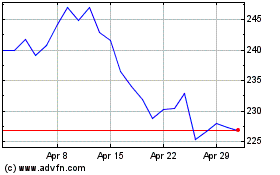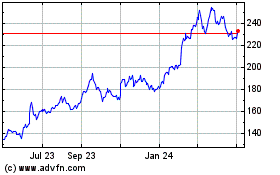Toyota's U.S. Chief To Retire In April -- WSJ
December 12 2019 - 3:02AM
Dow Jones News
By Ben Foldy
This article is being republished as part of our daily
reproduction of WSJ.com articles that also appeared in the U.S.
print edition of The Wall Street Journal (December 12, 2019).
Jim Lentz, the chief executive of Toyota Motor Corp.'s North
American operations who played a visible role during a safety
crisis earlier this decade, will retire this spring.
Mr. Lentz, 64 years old, will be succeeded by Tetsuo "Ted"
Ogawa, chief operating officer of the Japanese auto maker's North
American subsidiary, effective April 1.
Toyota is adapting to changing consumer tastes in North America,
its largest market, while making longer-term bets on electric and
autonomous cars that company executives expect will take decades to
play out, Mr. Lentz said in an interview Tuesday .
"I'm not going to be around long enough to see that through to
the end," said Mr. Lentz, who became the region's CEO in 2015. "So
it's important that we bring someone else now that can take us
through that next phase."
Mr. Lentz became the U.S. face of the company in 2010 when, as
head of Toyota's U.S. sales arm, he testified to Congress about
unintended acceleration problems, along with Toyota President Akio
Toyoda. In 2014, the company agreed to pay a $1.2 billion criminal
penalty to settle a federal investigation into whether it had
concealed issues that made its cars suddenly accelerate.
Mr. Lentz's tenure as the region's CEO coincided with a marked
shift in U.S. consumer preferences. Sales of sport-utility vehicles
have supplanted the smaller, fuel-efficient sedans Toyota had been
known for, leading the company to consider dropping some smaller
models from its lineup.
Toyota also is expanding its portfolio of hybrid-electric
vehicles -- which combine a gasoline engine with a large battery to
save fuel -- and said last year it hopes to increase hybrids' share
of its total U.S. sales to 15% by 2020, up from 9% last year.
The compact RAV-4 SUV has helped the company on both fronts. In
2017, the RAV-4 overtook Toyota's Camry sedan to become the
best-selling non-pickup model in the U.S., finishing in the same
position last year. In November, the company said a new plug-in
hybrid version of the model will go on sale next year.
This spring, Toyota said it would invest nearly $13 billion in
its U.S. operations through 2021, including $1.6 billion for a new
assembly plant in Huntsville, Ala., that it will operate with Mazda
Motor Corp., a move praised by President Trump.
In his time as CEO, Mr. Lentz also oversaw a multiyear
consolidation of Toyota's U.S. operations into a single campus in
Plano, Tex. The move, aimed at cutting costs and unifying
manufacturing, sales and research teams, was one of the most
significant changes the company had undertaken to its North
American structure since it first based its sales unit in southern
California in 1957.
Mr. Ogawa has been with Toyota since 1984, and came to the U.S.
after executive roles in the company's Chinese operations.
Write to Ben Foldy at Ben.Foldy@wsj.com
(END) Dow Jones Newswires
December 12, 2019 02:47 ET (07:47 GMT)
Copyright (c) 2019 Dow Jones & Company, Inc.
Toyota Motor (NYSE:TM)
Historical Stock Chart
From Jun 2024 to Jul 2024

Toyota Motor (NYSE:TM)
Historical Stock Chart
From Jul 2023 to Jul 2024
